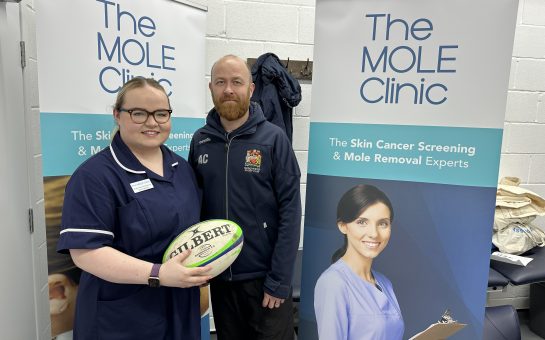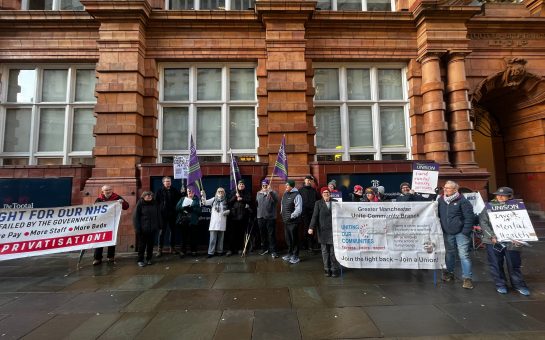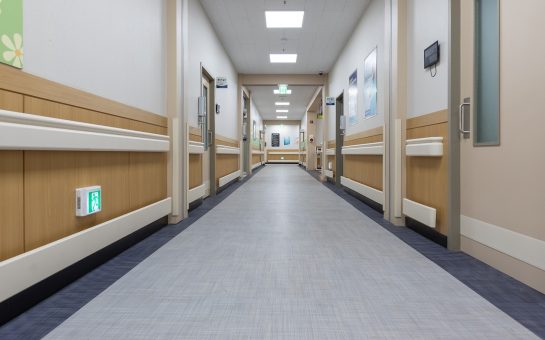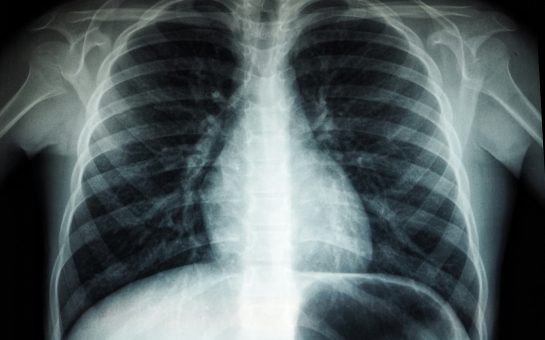It’s 7:30pm on a warm April night. Early summer is on the horizon, but there are no fully packed beer gardens or family barbecues.
Nurse Hannah Bontoft originally left the Intensive Care Unit at Scunthorpe General Hospital back in January, but is back on the ward, just leaving having completed a 12 hour shift.
She has been recalled on a short-term basis to ICU with COVID-19 about to hit hard. Only weeks earlier she had begun university training to become a midwife.
“I started in February after leaving ICU in January. I was four weeks into my placement as a midwife then we were told to stop”, Hannah tells me
The return was her own choice, but didn’t quite feel like much of one at the time.
“As a nurse I feel like you have a duty of care to go back.”
“We had loads of staff coming to help from other wards as other parts of the hospital were quiet.”
“Everyone was scared about going to that unit.”
It is estimated that over 40,000 people in the UK have died from covid-19. The peak of the pandemic it stretched the resources of the NHS.
North Lincolnshire and Goole Trust, also known as NLAG, is comprised of Scunthorpe General Hospital, Diana Prince of Wales Hospital (DPOW) in Grimsby and Goole and District Hospital.
It is just one of the 223 NHS Trusts that manage our hospitals across the country.
Like every single other, it had its own frontline to supply. Its own war on an invisible enemy, ready to be waged.
This is the story of the toughest months, from those engaged in the battle.
The Boardroom View
Dr Peter Reading has decades of experience working for the National Health Service, 18 of which have been spent as chief executive at various Trusts.
Yet nothing over those three decades could have prepared him for the challenges facing him and his staff in March.
“I have been working in the health service for 36 years. In some ways I have been challenged more in the last six months than I had previously”, Dr Reading told me.
“Many have had to work in circumstances that have been really, really difficult. Lots of practical circumstances like wearing PPE, different rules and regulations to reduce infection have made it more challenging.”
“The lack of precedent meant that we had to move at considerable pace. In the first month I, and many other leaders, were extremely worried about whether we were providing adequate protection for our staff. ”
“Circumstances changed daily in the first few weeks. The guidance coming out from government which we tried to work at all times was also changing.”
“We would be pointing one direction, the guidance would change, often with very good reason, and we would have to change to another direction.”
“Sometimes the notice we have had for that has been very, very late. So we have had to be very agile.”
This is the reality of how the pandemic turned NHS Trusts upside down, almost overnight.
Even at the very top of the organisation, they were having to work it out as they went along. A relentless challenge, the like of which they had never seen before.

How did ICU cope?
By mid-March, the number of patients requiring treatment for Covid-19 was already rising rapidly in hospitals across the country.
Intensive care units across the UK were bracing for impact. NLAG was no exception.
The issue of personal protective equipment (PPE) raged throughout that time. Demand was vastly outstripping supply.
The concerns of those in the boardroom were being realised.
At NLAG they, mercifully, were able to get on top of the situation relatively quickly.
“I think many of us in leadership positions felt that we needed to be using PPE much more, thankfully the guidance then came out to match it”, said Reading
“The lack of supplies have been a big factor in the way things have played out.”
For Hannah, even her previous experience could not prepare her for what was to come;
“We always had people with infectious diseases before, so are kind of used to PPE, but not to that extent. It was just mental.”
“It was pretty well managed initially. The issue arrived around May time, we were running out of gowns so some had to be stockpiled just in case, they could be rewashed.”
“I don’t think we ever got to a stage where that was done, but at one point the hospital thought there was going to be national shortage, so we started to save them.”
But those involved at all levels know that despite adapting to such a difficult way of working, the issue of PPE has not gone away entirely. Instead it now sits in the background.
“Things have improved now”, affirms Dr Reading.
“As we go into the winter and possibly a second wave, we are using PPE in ways we never did before. I am nervous about having further problems with it in a few months’ time.”
Clearly no-one is taking the issue for granted.
Nurse Becky Conway worked at NLAG’s Grimsby hospital during those difficult months in the intensive therapy unit, and found adapting to the high level PPE equipment difficult.
“I don’t think you really can ever get used to wearing PPE, because it’s frightening for every patient that was involved. Even if you are familiar with the strain of wearing it”, said Conway.
“It was really, just physically draining to wear for long periods. My face ached all the time.”
“Just simply checking the oxygen levels becomes so much more difficult. At the end of my shifts I felt like I had been in a fight.”
By early-April the two intensive care wards across both hospitals were full to capacity.
For Hannah, the main difficulties was around carrying out the most primary task of all in healthcare, reassuring the patients.
“For them it must have been awful, particularly for the confused ones, because we were all terrified”, she said.
“The mask sucked into your face, after two hours with it on you would get a pressure sore.”
“It did make me feel safe though, in fact I never really considered that I was putting myself at risk. In terms of the level of staff that were infected, our ward was actually one of the lowest in the hospital.”
The response had to be a team effort, perhaps because the alternative was unthinkable. A choice emerged of pulling together or letting the disease overwhelm key areas.
A common theme to emerge was the spirit amongst those on the shop floor. In the face of death, and personal risk the only thing getting the frontliners through the ordeal was each other.
“Morale from the team was so much better than it has ever been before”, said Hannah.
“It was survival mode and the team were so close.”
“It just felt weird, maybe that’s because you were in PPE as well. As soon as you went through that door it was like another world.”
“I’m glad I was doing what I was. I’m a bit of a control freak at the best of times, so I would have struggled with just being at home.”
The struggle particularly hit hard when other members of staff required treatment for the virus.
“The lowest point was when we were looking after a real senior member of our staff. That was when things got a bit real”, said Hannah.
“I think at one point just slightly less than half the beds on our unit were staff members.”
“That was touch and go that day it was awful, I didn’t know how to deal with it. It was difficult to disconnect your personal feelings when you know them.”
The sacrifices made by those working within clinical areas were certainly not underestimated by those at the top.
Chief-executive Dr Reading said, “The risk of looking after Covid-positive patients obviously carries potentially serious risk to our staff and I would like to praise the courage of those staff as well as their dedication.”
“I think people have risen to the challenges very well. We have learnt from it, stuck together and supported each other.”
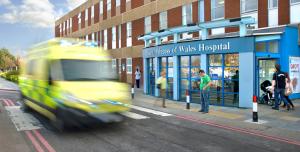
The NHS is the closest thing the UK has left to a national religion, something we all care about and want to hold onto.
Yet it hasn’t been in the best shape for some time.
Rumours swirled before the last election, and with good reason. Where would it be after five years of hard-right Conservative government?
An American sell-off? An Insurance system? At the time it didn’t seem far-fetched.
The worries expressed many appear to be with good reason. The number of hospital beds have halved over the past thirty years and expected to keep falling.
Yet the one small positive we might be able to take from the coronavirus crisis is that it has reaffirmed people’s love and support for the service and their genuine respect for the people that run it.
“There is no question it’s been a very tough time for all of our staff and of course patients. I would like to praise our staff, I think they have risen to the challenge superbly”, said Dr Reading.
When Prime Minister Boris Johnson tested positive for the virus, and subsequently went into intensive care himself, it likely spooked anyone left that thought the threat wasn’t real. Frontline healthcare workers were referred to as heroes with increased frequency.
In truth, they always have and always will be heroes, but for those few weeks at the height of the pandemic it reached fever pitch. Every Thursday so many households across the UK went out to clap. At the time it felt strangely moving- a symbolic gesture of solidarity for key workers.
But what did those actually experiencing the death and destruction caused by Covid, make of a nation suddenly desperate to express their gratitude.
“When you come home from your shift and everyone is saying ‘well done’ and clapping, but no-one really gets it”, said Hannah.
“But the majority of people adhered to the lockdown which worked, although one time after a really busy shift I saw a group of kids sat together with a bonfire and that pissed me off.”
“You just think about saying, ‘I’ve just done a 12 hour shift on ICU watching people die from Covid’ so that was frustrating.”
When I asked how she could clear her head post-shift the answer was simple. “A lot of running”.
“You got through on adrenaline, but then when you processed it… it was difficult to switch off.”
It was perhaps inevitable that mental fatigue became a factor.
“It was like when you have a really big shock in your life and don’t know how to react. I coped ok, but it was just weird. A complete whirlwind”, said Hannah.
“I remember once I came on a shift, and a lot of my colleagues were in tears. They had just had a young person death to deal with. That was unbearable.”
“You had the added pressure to support each other as well.”
Staff did also have the option of speaking to someone if they needed to. A mental health nurse visited intensive care to make sure support was on offer to those on the frontline.
“I think levels of support improved as time went by. Everyone was shocked initially”, adds Conway.
The Trust recognised it was a really difficult time for everyone and provided access to an online mental health and wellbeing resource.
They also provided weekly webinars, to support the psychological well-being of staff and provide coping strategies for those struggling, together with weekly supervision sessions to provide a safe space for reflection.
Many felt that this crisis brought the nation together, unifying a country that had been splintered by Brexit and a divisive election. As if we were all taking on this virus as one.
Some would also suggest we are a kinder society and more appreciative of our NHS.
Whilst this may be a positive and something we should hold onto, the reality is only a select team of dedicated workers have experienced the true horrors by simply doing their job. 12 hours on your feet in PPE, day-in day-out.
It’s hard for the people who experienced it to explain, let alone those of us on the outside to fully understand.
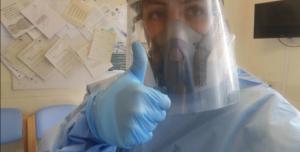
Where has it left the people involved?
Resilience is key to surviving a battle and the pandemic is far from over, but at this Trust, they can start to look towards the end of this particular tunnel, while recognising that further dark times may lie ahead.
Case numbers have significantly lowered. At the time of writing (12th August) the Trust had not had any Covid-positive patients for four days.
At both boardroom and base level, those involved can breathe a little easier. A short period of light-reflection and respite to recover.
For the time being, Hannah has returned to her studies to become a midwife which is due to be completed in September 2021 (barring a post-coronavirus extension).
“The majority of our staff seemed to just about be ok from it. But it was really touch and go for a lot of people, especially when you have just witnessed a thirty-year old die”, she said.
It still surprises me that in undertaking such a challenging role, this 25-year old never considers it a choice to put other people’s needs before her own.
“When things are that desperate you just go into survival mode and you surprise yourself how actually, you aren’t that scared.”
“Looking back now though it was scary. That release (from auto-pilot) only came a few months later.”
“From the day I went back in, I think the Trust has coped pretty well. They managed as well as they could.”
Becky, who is still on the ICU ward in Grimsby feels the whole experience has changed her, for the better.
“I honestly think I have a better perspective than in February.”
“I always knew from a young age I wanted to be a nurse, but I never thought I would experience anything like this. It’s reminds you what’s important.”
For Dr Reading, the question as to what he has learnt appears to be a first chance for any kind of self-reflection.
“I suppose I have learnt more about being adaptable. I think I have learnt about the way in which I work, something like this provides real insight.”
“Whilst I maybe long in the tooth, I learn something new every day I am at work, and this period has just accelerated that.”
And as for NLAG as a whole?
“I actually think the team as a whole, is actually stronger for going through this than it would have been otherwise.”
One common thread identified between all involved was their clear resilience, their ability to keep going despite what they were facing on a daily basis.
This resilience will be called upon again should the much talked about second wave become a reality, as winter approaches.
